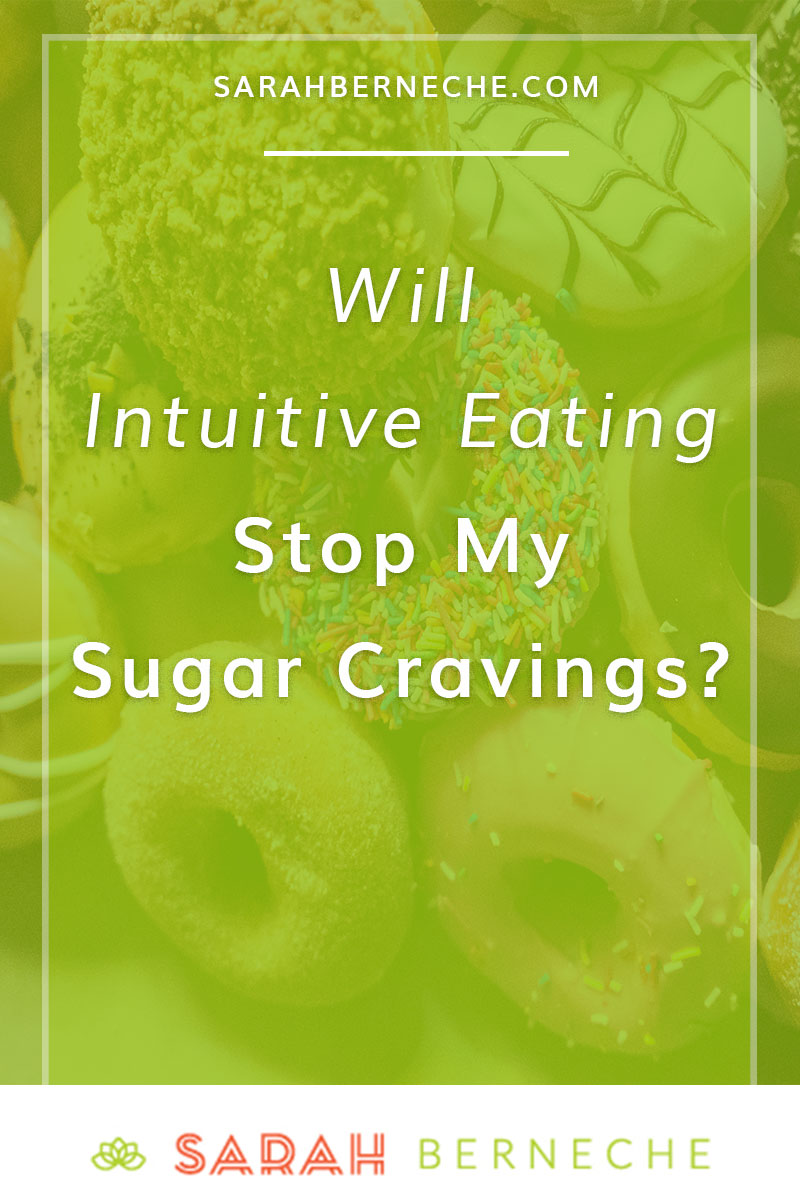I’ll be honest: most of the clients who come to me want to lose weight (or at least maintain or “manage” their weight without a restrictive meal plan or eating style). Weight-loss goals must be shelved when pursuing intuitive eating, as even the perception of restriction can compromise your ability to tune in to your internal wisdom and embrace an intuitive approach. This is really intuitive eating pre-work, a mindset shift that must occur for intuitive eating to truly be effective (you know, to experience food freedom.)
But let’s say you’ve done the pre-work to shelve the weight loss goals. Ready, set, go.
Not so fast.
Even if you’ve shelved the hope of weight loss, it can come up again in the desire to limit “forbidden foods” like cookies, cake, and ice cream by becoming an intuitive eater — which is just another layer of restriction.
If restricting sugar doesn’t work, maybe giving myself unconditional permission will, right?
While intuitive eating is an excellent tool for reducing the charge associated with some of your favourite (off-limits) foods, it doesn’t mean you’ll eat fewer of them or enjoy them any less.
If you’re embarking on or are currently working your way through intuitive eating in the hopes that one day, when you are cured of your dieting ways, you will be delighted eating carrots and hummus, never daring to dream of those to-die-for chocolate chip cookies at the coffee house down the street, I have three words for you: hold up, homeslice.
What do you hope you will gain by limiting your sugar intake?
For some people, this desire to stop “eating so much sugar” arrives in the guise of health. We’ve been conditioned to believe that every bite of chocolate, every nibble of donut, and every spoonful of ice cream is slowly leading to disease and killing us.
While all nutritional information or recommendations require context to be of any real value, even the World Health Organization — which is more conservative when it comes to sugar consumption — considers deriving up to 10% of your daily energy needs from added sugar to be safe. Translation: you can enjoy dessert every day, allowing your cravings and food interests to guide the way.
The notion that every food choice is healing or harming oversimplifies a terribly complicated interaction.
Keep in mind that the root word of disease literally stems from désaise (Old French), meaning discomfort or distress. This unease isn’t limited to the physical realm, but applies equally to the psychological. If you spend more time stressing over the chocolate cake than eating it, talking about how you’re going to compensate for the chocolate bar you ate too quickly to enjoy, or overthinking the potato chips you ate at last night’s party, it’s time to consider your mental state in the maintenance of good health.
For others, the desire to limit sugary foods is more covert during intuitive eating. Diet culture can be super sneaky, and you may find the desire for weight loss pops up wearing different clothes (such as in concerns over sugar consumption.)
I say this with a lot of compassion.
It’s tough work to give up the trappings of diet culture and embrace the wild world of intuitive eating when diets have provided so much safety and comfort for so long. But it’s also important to unpack what diet culture has (or hasn’t) provided you with, and how you can get your needs met more deeply.
Ultimately, though, intuitive eating may or may not lead to a diminished desire for sugar. What’s possible is that by developing a healthier relationship with sugar, you will feel less out of control around the office cookie jar, actually enjoy the chocolate you do eat, and have that coffee shop pastry on Saturday morning without post-experience guilt and shame.
While you may sometimes want more “nutritious” foods over fun foods, this can’t be the goal of intuitive eating. In the same way that work must be balanced with play (or time off) to prevent burnout and promote self-care, it’s completely natural to want to balance intake of nutritious foods with a steady supply of pleasurable foods. Prioritizing extrinsic values — like needing or expecting your eating to look a certain way to feel okay — will interfere with your ability to connect with your internal wisdom and ultimately reach a place of self-acceptance with yourself and your body.

[…] new and experienced intuitive eaters are curious whether ethical restrictions can co-exist with intuitive eating. My take? In short, yes — many intuitive eaters live with food restrictions for medical, ethical, […]